- Home
- Michael Grant
Front Lines Page 31
Front Lines Read online
Page 31
They stand before an Army L-4, basically just a Piper Cub. It has a single engine and a single overhead wing, without weapons, armor, or speed to protect it. It has two seats, one behind the other, and only one cramped door that requires Rainy—newly bulked up with not one but two parachutes—to squeeze in with great difficulty.
Though she’s not a big person, Rainy is squashed in a sandwich between her own seat back, her main chute, her belly chute, and the pilot’s seat back. This does nothing to calm her, but, she reminds herself, she’ll have lots of fresh air as she plummets toward the ground.
Skip revs the engine, which is not a reassuring sound, and the tiny plane goes bouncing down the dirt field, swerving to avoid a mud puddle and then lifting off in a sort of crablike, half-sideways fashion.
The cockpit is tiny and freezing but at least there are ample windows, and with the wing above them the view of the ground is good. They fly over the town of Maktar, on overcultivated fields now fallow as they head into winter. It’s interesting enough for a while—Rainy has not only had no experience with parachutes, this is her first time up in a plane—but it soon becomes monotonous as signs of human habitation disappear and the ground below becomes one long stretch of sand and rock.
She passes the time replaying her hasty instruction in the use of the parachute. Climb up into the doorway, legs dangling out. Push hard away from the plane and for God’s sake don’t pull the rip cord too soon. Or too late. Or forget to pull it at all.
And if the main chute should fail to deploy, she should calmly and without panic go to her emergency chute. Calmly. While falling like a rock.
They run into some turbulence, and the little plane starts to rise and fall just like a boat on the waves, elevator up, and a playground slide down. Up . . . down. Up . . . and the combination of the movement and the fear, the growing fear of jumping, turns her stomach acid. She needs to pee. She needs to vomit. She needs to not be here, not be in a tiny plane on her way to the middle of nowhere, and not be contemplating a parachute jump with zero experience.
Skip yells something back to her that she cannot hear, so he makes a chopping motion off to their right, and when Rainy looks she sees vehicles on a road, heading north. They’re nothing but tan rectangles, but she’s had enough training in reading recon photos to recognize German tanks and trucks. They’re leading a long plume of dust.
Those are the Germans she’d have run into had she tried to reach her destination by jeep. Unfortunately this means she will almost certainly be cut off once she drops, retreat barred by the enemy.
Skip holds the stick with his knees and jots notes into a notebook, tapping his compass to check their bearing and unfolding a map to compare what he’s seeing and what the map wants him to be seeing.
Skip reaches back to tap her leg and get her attention. Then he holds up one hand, fingers splayed.
Five. Five minutes.
This is a terrible idea.
This is crazy.
This is suicidal.
She feels like something large is stuck in her throat, like she tried to swallow a hamburger in one bite and now can’t get it down. Her heart is pounding in her chest.
Skip motions again, and now he unlatches the door, which will be hard to push open against the wind. Harder still is climbing up there. Left leg forward, squeezing, sucking in her breath while all the while she feels she can’t breathe, leaning into Skip, her weight on his left shoulder, her face practically pushed into his bald spot. He’s scrunching over as far as he can get while still keeping a hand on the stick, and then she slips. Her hand reaches instinctively for anything solid—the stick—and the plane plunges right and down. Something much bigger and much, much faster goes blazing by.
Backwash buffets the plane, it’s rattling, the engine is coughing, the door is unhitched, and in the wild careening Rainy sees the flat-nosed Focke-Wulf 190 banking into a tight turn to come back at them.
“Now or never!” Skip yells.
She’s got her back to the door, hunched over like a cooked shrimp.
“Are we there?”
Skip strong-arms her, pushing hard on her chest. Her hands tear loose from their hold, the door bangs on her thigh, air pressure like a hurricane hits her full force, and she’s falling, tumbling, head over heels, head over heels, like an acrobat.
She does not scream but wants to, her mind a blur, her body in a state of rigid panic. But a part of her brain, some cold, calm, reasoning fragment, says, Pull the rip cord, you meshuggeneh fool!
She pulls the cord. Nothing happens. She’s stopped breathing. The desert is whirling around, blue sky, beige dirt, blue sky, and then there is a sharp, almost brutal jerk that digs straps into her crotch and gives her whiplash as the chute brings her upright, feet dangling.
But she’s still falling, falling to her death . . . No. No, she can see the white-silk canopy above her, so she’s done it, she’s done it, she’s parachuted.
You still have to land!
A quarter mile above her and away to the south, the spotter plane comes apart, pieces flying as the Focke-Wulf pours machine gun fire into it. She watches but does not see Skip getting out, does not see a second chute blossoming, just the plane falling nose-down in wild loops. Part of the wing comes off, and the loops become a disorganized tumble.
She looks away as the plane hits the ground, a puff of dust, soundless.
And the ground is rushing up at her, and she forgets everything she was told about landing, no bracing, no bent knees, no rolling to spread the impact, she hits hard, bone-jarringly hard, and falls over. The chute, still full, drags her on her back for a few feet before she can roll over, get first to her knees and then to her feet, and the chute collapses.
She works her way free of the parachute harness. Rainy Schulterman has just parachuted behind enemy lines. And gotten a man named Skip killed.
Featureless desert sand in every direction. She lies on her back, panting, willing her heart to slow down enough to actually pump blood rather than just hammer at her rib cage.
“Get up,” Rainy orders herself. “Move!”
Direction is easy enough: she can see the sun. And she remembers seeing a road on her way down. East. That’s right, east. She walks a few steps, collapses to her knees, pushes herself back up, and heads on again.
The unit she’s looking for is out there somewhere, a somewhere that looks a whole lot larger from ground level than it did on a map.
She has survived the jump, she reminds herself, and that was the hard part, surely. How hard can it be to find fifty or so soldiers in a million miles of trackless emptiness?
It takes a half an hour just to find the road. She flops beside it, nervous and scared as hell, but alive. If only she knew . . . anything, really, about the survival skills a soldier should have. If only . . . The plan had been to spot the platoon, fly low, give them a wing wag to get their attention, then jump.
That did not happen. But the fortunes of war that had turned against her and dropped her here, lost and abandoned, now capriciously come to her rescue.
There is a jeep coming down the road, hell-for-leather, a single soldier at the wheel.
Rainy climbs heavily to her feet and then, composing her face into a calm and, she hopes, authoritative expression, steps out into the middle of the road.
32
FRANGIE MARR—TUNISIAN DESERT, NORTH AFRICA
Two fears vie for the upper hand in Frangie’s mind. First, that she might do something stupid and kill the wounded captain. He’s almost certainly dying anyway, but the Hippocratic oath is pretty clear: first, do no harm. She has done what she can; now she can only offer comfort and morphine.
The second fear is simply of the sounds of trucks and men approaching.
She does not want to serve out the rest of the war in a prisoner of war camp. It is inconceivable that the racist Germans would be any better than the racist Americans in their treatment of blacks.
She wants to flee. There would be n
o shame in it, not really; the captain is doomed. The sergeant who stayed to help finally leaves with a terse, “Thanks for taking care of my captain.”
Ren remains behind still.
“Ren, get the fug out. Seriously, go. Go! I’m ordering you, go!” It is the first time Frangie has ever cursed, and she marks it in an abstract sort of way as something she will later pray over.
The bottle of plasma hangs from a lanyard dropped from a seam in the tent. It joins the transfused whole blood and flows now into the captain’s arm, slightly more going in than comes out, though soon enough the plasma will be empty and there’s no more whole blood to be had.
“Am I dying?” the captain asks in a shaky but rational voice.
Frangie wants to tell the truth, maybe then he’ll order her to leave, to escape. But that isn’t how it’s done. A medic does not tell a soldier he is dying.
“You’ll be fine, Captain. Just sewing you up is all. Sew you up, bandage you up . . .”
“Okay, listen . . . I’m going, Doc,” Ren says, looking tortured but relieved.
“God keep you, Ren.”
“You, too, Doc. I’ll say a prayer for you.”
“I’ll need it.”
He grabs a canteen and runs for it. Frangie listens for the sound of gunfire and blessedly hears none. But the sound of truck engines and tank treads and the rattle of soldiers’ gear fill her hearing and her imagination.
Her hands are steady as she sutures, but tears flow and she is having difficulty swallowing. Maybe the Germans will see that she is a medic with a patient and do the decent thing and leave her to it. After all, they can’t really all be the monsters the propaganda makes them out to be. Surely there is something to the notion of soldiers’ honor, surely—
The tent flap flies open, and three German soldiers rush in yelling incomprehensibly, leveling their submachine guns. They look tired and dirty but keyed up, blue eyes searching every corner of the tent.
“Schwarze!” one says, his look contemptuous. He shoves the barrel of his machine pistol into her stomach, hard enough to double her over. The suture slips from her hand, she struggles to get it back, and the stock of the gun smashes against her forehead.
The whole world spins. Her knees collapse and she falls to the dirt, landing on her side, still struggling but unable to focus, unable to see anything but swirling, doubled reality. A blow to her kidneys, a kick, has the paradoxical effect of clearing her mind so she can focus on the agony that radiates up and down her spine. She lies on her side, panting, seeing in the dirt before her the bloody, twisted lead slug she took from the earlier patient. Bloody rags are all around. Some sort of rat is carrying one off.
Frangie does not yet expect to die, but she expects to be hurt, she expects a second boot and it is not long in coming, this time smashing her tailbone. The electric agony she’d felt before is worse now. Her stomach heaves, but it is empty. She gasps and inhales dirt, which starts a coughing fit. She pushes at the ground, trying to rise, knowing it will just set her up for another blow.
But the next blow does not come, and she manages to get to her knees, head hanging down, lungs burning for oxygen, nerve pain zapping through her, tingling her hands and feet.
Someone new is in the tent, and his presence has calmed the excitable soldiers. Frangie twists her head and sees an expensive-looking pair of leather boots. They are caked with mud and adorned with spurs—she’s only ever seen spurs in cowboy movies and their presence here seems like a hallucination.
Powerful hands grab her shoulders and haul her to her feet. Blood sheets down over her eyes, and she wipes it away with her arm. She cannot stand fully erect, not yet, leaving her to look and feel even smaller than usual.
She tries to look at the man in the boots but her eyes will not focus and all she can make out is that there are three soldiers in butternut-colored uniforms, and the spurred man wearing dusty black.
The man in black speaks. Is it German? No, the words are accented but familiar. English, but pronounced like a war movie villain. She struggles to make sense of it, to get her brain to work properly, to understand—
A hard slap across the face knocks her against the table. She is almost facedown in the captain’s ruined belly.
“Where have they gone?” the spurred man demands.
“Gone?” she mumbled, uncomprehending.
“Your unit. Your men. Where have they gone? Where is their rendezvous?”
She blinks and wipes away more blood and turns with slow, arthritic dignity to face her interrogator. Her vision focuses on silver collar patches, each marked by the SS lightning bolts.
She does not then recognize the significance of those emblems, nor can she decipher the insignia of rank on his uniform, but she knows him to be an officer by the stiffness in the poses of the soldiers.
“I will strike you again, if—”
“They ran off,” she says.
“Where are they going? What is their destination? Are they joining another unit?”
She shakes her head and cries out sharply at the pain that swarms her. “I’m just a medic. Just trying to sew this man up.”
“You stayed behind to care for him?”
“Leave her alone, she’s just a Nigra,” the captain says from the table.
The German officer jerks his head, and before Frangie can protest, one of the soldiers steps close, presses the barrel of his rifle against the captain’s head, and fires once.
Bone and brain explode from the opposite side of the captain’s head. A piece of skull shatters the hanging bottle of plasma.
“Damn it!” Frangie cries. “You didn’t have to do that! You didn’t have to do that, he was dead anyway!”
“Then no harm has been done,” the officer says, and grins, revealing uneven but bright-white teeth.
He snaps orders to the soldiers, who immediately begin to gather up what medical supplies remain.
His next order will be to shoot Frangie, unless rape is on the menu first, and from the look in at least one of the German soldiers’ eyes, it is. He is anxious, she can see it, anxious lest the officer order that she be killed before he can have his fun.
The officer says two things, neither decipherable, but it makes the soldier with the hungry eyes grin. The officer laughs indulgently, as though he’s jolly Saint Nick handing out presents, then he turns and leaves.
Before he has cleared the tent flaps, Hungry Eyes’ belt is unhitched and the other two are crowding in close.
“No, don’t,” Frangie says, knowing it won’t help, knowing in her heart that the officer has told the men to have their fun and be quick about it, and then shoot her.
The tent flap opens again, a second officer, this one in gray. His uniform is stained with blood as well as mud. He speaks in German, as harsh as the first officer, but with more irritation in his tone, more like a stern schoolteacher addressing stupid pupils.
The soldier with his pants down around his ankles remonstrates, but this just sets off a torrent of derisive abuse. Reluctantly and angrily he pulls his pants back up, creating mirth among his fellows, who follow him as he rages out of the tent.
“I am Oberstarzt Hefflewezen. Doctor-Major to you,” He leans over the dead captain. “These are your sutures?”
Frangie grunts a yes.
“The wound is septic, he would not have lived.”
“I know that.”
He sighs, not a sympathetic sound, an annoyed one. “Your officers are fools leaving a medic behind. They will come to regret it.”
I already regret it, she thinks bitterly, though despite everything she does not quite believe it.
“You are my prisoner.” There is subtle weight on that word my. “My company has several cases of typhus. I have no time for routine bandaging and suturing.”
Lest Frangie believe she has fallen in with a sympathetic medical professional, the doctor grabs her by the back of the neck, squeezing painfully hard, and shoves her toward the tent flap.
She is startled to see that the gray light of morning is in the eastern sky. German soldiers pick over the remains of the abandoned camp, looking carefully for booby traps, scrounging for food and water, hoping for alcohol.
The German unit is a long column of trucks, most of them tankers carrying either water or fuel. There are two half-tracks—lightly armored vehicles with tank tracks at the rear, conventional tires up front, an open bed that carries nine or ten German soldiers, and a machine gun mounted over the low, sloped roof of the driver’s compartment.
The column is starting to move again, engines roaring, gears grinding. Frangie sees the SS officer in an open staff car, drinking something from a thermos bottle.
Doon Acey’s body lies still unburied, laid out on the ground beside the road with three other American dead, awaiting graves registration units. A bored-looking German soldier methodically shoots each corpse in the chest and head. Bang, bang. Bang, bang. Bang, bang. Bang, bang. Making sure the dead Americans stay dead.
The column jounces and sputters past, truck after truck, until a green-painted ambulance adorned with a red cross very similar to the one on Frangie’s helmet appears. Behind it, just ahead of the final half-track, an open, slat-sided truck full to overflowing with wounded Germans.
“You,” the Doctor-Major orders, and shoves Frangie toward the truck. She catches the tailgate and climbs aboard on shaky legs to be met with hostile stares from men with every variety of battlefield injury. One man winks at her and grabs his crotch suggestively. Another spits in her general direction, though with insufficient force, so it lands on the helmet of a man who is either unconscious or dead.
Frangie sits as far back as she can from the more threatening enemy soldiers. A private running from the ambulance tosses her a small box marked with the red cross. It contains bandages, tape, scissors, and sulfa powder. There’s a smaller box that should contain morphine, but it’s been emptied, presumably to keep her from killing one of the Germans or herself.

 Fear
Fear Plague
Plague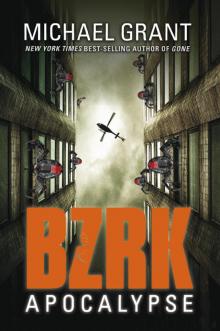 BZRK: Apocalypse
BZRK: Apocalypse Bzrk
Bzrk Love Sucks and Then You Die
Love Sucks and Then You Die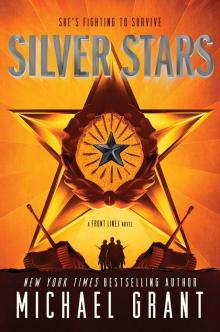 Silver Stars
Silver Stars The Key
The Key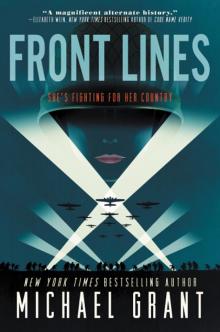 Front Lines
Front Lines BZRK Origins
BZRK Origins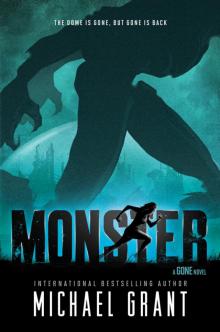 Monster
Monster Gone
Gone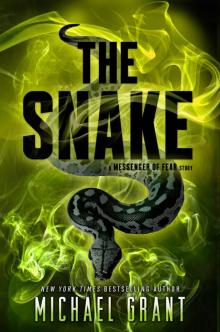 The Snake
The Snake The Power
The Power Hunger
Hunger Lies
Lies A Sudden Death in Cyprus
A Sudden Death in Cyprus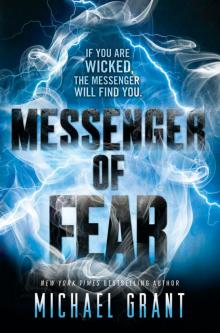 Messenger of Fear
Messenger of Fear Eve & Adam
Eve & Adam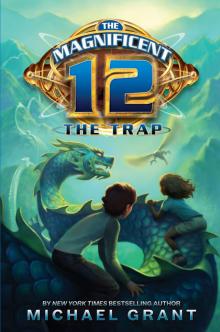 The Trap
The Trap Light
Light An Artful Assassin in Amsterdam
An Artful Assassin in Amsterdam The Call
The Call Hero
Hero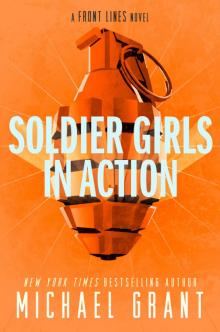 Soldier Girls in Action
Soldier Girls in Action Purple Hearts
Purple Hearts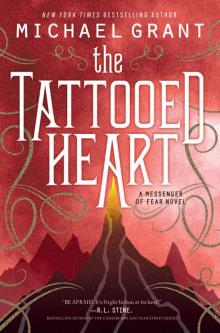 The Tattooed Heart
The Tattooed Heart The Fall of the Roman Empire
The Fall of the Roman Empire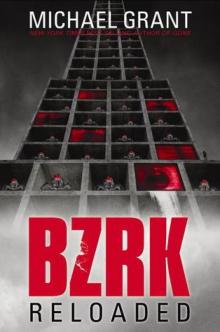 BZRK Reloaded
BZRK Reloaded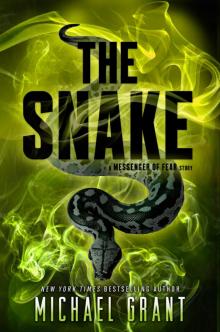 Messenger of Fear Novella #1
Messenger of Fear Novella #1 The Magnificent 12
The Magnificent 12 Fear: A Gone Novel
Fear: A Gone Novel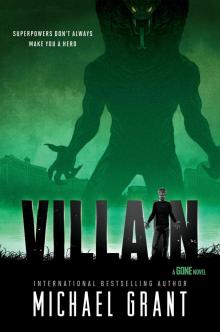 Villain
Villain Manhattan
Manhattan Eve and Adam
Eve and Adam Plague: A Gone Novel
Plague: A Gone Novel Fergie Rises
Fergie Rises In the Time of Famine
In the Time of Famine Hunger_A Gone Novel
Hunger_A Gone Novel Lies g-3
Lies g-3